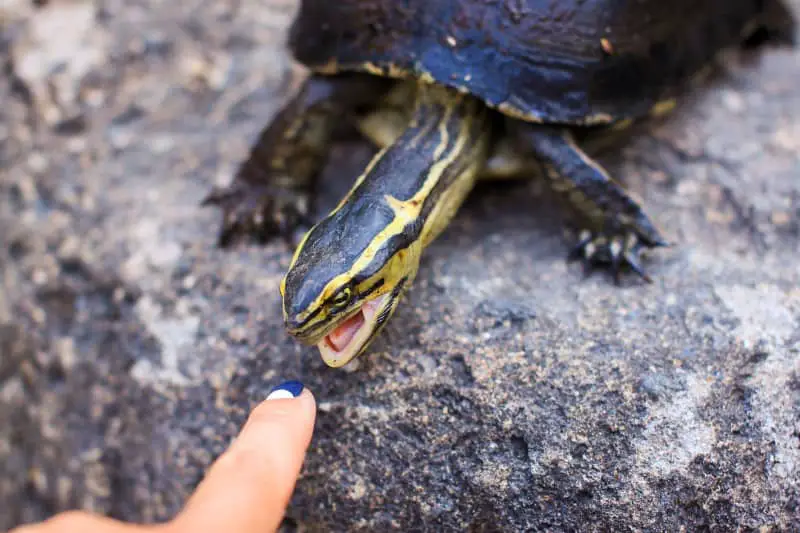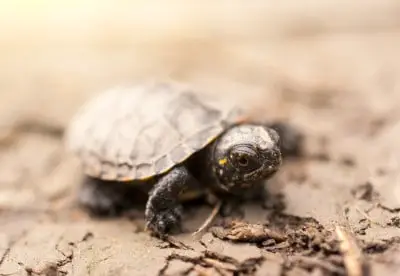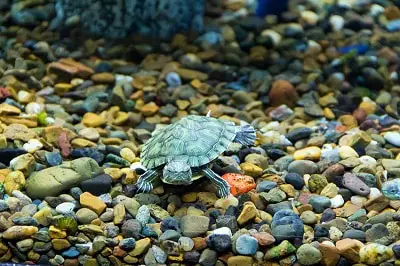All animals have a skill set that helps them survive in the wild. Where the turtles lack in speed and agility, they make up for it by their tough shell and surprisingly a strong bite. Therefore, you may wonder when your pet turtle is most likely to bite you.
Turtles bite when they are frightened and need to defend themselves from potential predators. As a turtle owner, you will likely find your pets biting themselves, other turtles, and chewing their substrates like rocks. Their bites can be severe depending on the species, size, and diet, with giant turtles and carnivorous species capable of severing limbs.
Therefore, to find out all about the turtle’s little-known defense mechanism, read on for 12 facts you should know.

Do Turtles Bite?
Apart from their tough shells, turtles use their jaws for defense when they have to, especially in the wild. They bite other animals, each other during duels, or even their owners. The reptiles will bite if they perceive another creature as a predator since they do anything they can to defend themselves. These pets can also bite in exceptional circumstances, but you don’t need to worry if you have tiny turtles because their bites are not as deadly as that of the giant species.
Giant turtles’ can pull out skin, draw blood, or severe a finger depending on how aggressive and assertive they are. However, some turtle species are more likely to bite than others. The snapping turtles, for instance, are at the top of the most ferocious turtles in the wild. Just by going with their names, these species are pretty aggressive and have the deadliest bites. Turtles and tortoises are adventurous and opportunistic feeders, meaning that they will explore the things they find to see whether they are edible. If it looks yummy, be sure that your pet will crunch it to find out.
You may even be on the receiving end of the experiment because there are cases of turtles biting their owners. As it turns out, your turtle may consider your wiggly toes appetizing. Hence, it is advisable to wear shoes or socks when your pet is crawling around. Due to this, owners are wary about leaving their turtles with children unsupervised. It is wise always to be present when your kids interact with the turtles to watch out for any such incidences.
Do Baby Turtles Bite?
Biting is an innate skill that turtles take up automatically after hatching. It may manifest after some time, but juveniles can bite too as a defense mechanism. The intensity and severity of the bite depend on the turtle’s size; the more significant the turtle, the stronger the bite force. Therefore, a baby turtle’s bite isn’t as lethal as that of an adult. It is only mild and may fail to show marks or injure anyone. However, it doesn’t mean that you should ignore baby turtles entirely because they can still bite and hurt small children. Be wary, particularly of the snapping turtle, because they still have painful bites despite the size or age.
Bites of Popular Turtle Species
However, pets and turtles in the wild can bite. Hence, you need to understand how different turtle species bite to know what to expect and how best to take care of yourself and your family.
- Snapping Turtles
Snapping turtles are the most likely to “snap” at you, just as their name suggests, especially if they perceive you as a threat. They are famous for their powerful jaws and tendency to fight back. There are two types of snapping turtles subspecies; the common and the alligator, both ferocious in their own right.
Although they usually live in the wild, these turtles are muscular and robust, which reserves them only to experienced turtle keepers. It is advisable to let them be if you find them in their natural habitat but if you must move one, be careful to do it safely. Pick it up using a shovel or wrap it in a towel but don’t grab it, especially by its tail.
- Painted Turtles
The painted species are one of the timidest turtles in captivity. They are particular about their space and prefer that you don’t touch them often. Due to their fear of handling, they usually feel threatened when people pick them up, especially strangers. It makes them quick to bite, scratch and kick to defend themselves. They have sharp mandibles and powerful jaws and won’t hesitate to attack if they have to.
- Musk Turtles
Many people think that the musk turtles are innocent and sweet, but they can be pretty aggressive beneath the surface. They are not the best turtles for kids because of this feature. They usually bite their enemies or potential predators if need be. The bites are intense, painful, and can cause serious harm.
- Mississippi Map Turtles
This turtle species is generally friendly but occasionally shows aggressive tendencies. They use their sharp beak-like mouths to bite when they want to attack their prey and when they feel agitated or scared. They also love their alone time and quiet; therefore, they will bite strange handlers or anyone that tries to disrupt their peace.
- Florida Softshell Turtles
Another rather violent species when you provoke it is the Softshell. They are generally medium-sized turtles that you can easily distinguish due to their leathery armor. Juvenile softshells are not as lethal as the adults but can still deliver pretty powerful bites. People find their bites painful and may cause serious harm to the victims depending on the bite force. They also have an elongated neck, making them stretch when necessary to bite their offenders.
- Red Eared Sliders
These turtles will also bite, but only if they think you will harm them. Even the wild sliders will hardly bite for the sake of it. It is primarily the aftermath of maltreatment or mishandling, which rarely happens when they are pets. The bites can be painful, primarily when they come from adult turtles. However, it would only be severe to children and not adults.
- Mud Turtles
Don’t let the mud turtle’s cuteness fool you. These adorable creatures have the potential to bite using their beaks if they get scared. Most people think that they are docile, but it is valid only if you don’t make them nervous by mishandling them. It is why experts advise against picking up mud turtles in the wild because they will likely attack thinking that you are a predator.
- Box Turtles
Unlike other species, the box turtles rarely bite or snap at people. They are generally polite and calm, making them one of the best pets for children. However, since biting is an innate skill, you can expect them to do it when they get frightened. They will fight back if they feel that their lives depend on it. Regardless, it would be safe to avoid handling wild box turtles or other people’s pets unless you are confident that they are comfortable under your touch.
How Hard Do Turtles Bite?
The intensity of a turtle’s bite depends on its size and diet. What matters the most is the type of food your pets usually eat. For instance, you can expect a carnivorous turtle to have a more powerful bite force than an omnivorous counterpart. Since meat is more complex to chew into than vegetables, the turtle has evolved to have a firm grip and the ability to rip out the flesh.
You will realize that their mouthparts are sharper and are more lethal than other turtles. Next on the ferocious list are the omnivorous turtles. Since they also have meat in their diet, they wouldn’t have a problem biting into human flesh and causing severe damages. Lastly, we have herbivorous turtles. They only eat fruits and vegetables; hence, they don’t need to have a strong bite.
If they do, it may be mild and leave marks but will not necessarily draw blood. It would be best if you were very cautious about the carnivorous turtles. They can easily detach a digit and cause severe bleeding depending on the size and the grip they have on the flesh. Generally, the more giant the turtle, the more painful its bite since it has a more prominent jaw and is usually muscular.
Are Turtles Poisonous?
Turtles have strong beaks that can severely bite you, causing scars or, in extreme cases, amputation. Although the reptiles can be aggressive, there are no confirmed cases of turtles being poisonous. A turtles’ bite isn’t poisonous, only that it may transfer salmonella infections. Turtles, like other reptiles, host the deadly salmonella, which is a threat to your health. Unless treated, these bacteria can cause severe damage to individuals, particularly those with low immunity.
It is advisable to improve your hygiene when you become a turtle owner. You need to wash your hands with water and soap every time you come into contact with the reptile or any of its belongings. Note that not all turtles have salmonella. However, you can make hygiene a habit and assume that your pet is a host for your safety and that of the people you love.
Do Turtles Bite Each Other?
Turtles love living in isolation, especially in the wild, but they cross paths frequently, especially during mating. Biting is usually seen in males as a show of dominance and aggression. Males can be territorial and hostile to other turtles who want to invade their space. They fight and bite to establish dominance as their ultimate way to solve disputes. Males can also gently bite females during mating.
When they face starvation in the wild, turtles, like other reptiles, can also turn on each other in cannibalistic acts, especially the predatory species. Scarcity also forces them to attack juvenile turtles as they turn them into food. You can also notice your pets biting and fighting while in their aquarium as they get older and feel overcrowding.
Why Do Turtles Bite Themselves?
Turtles may bite themselves for numerous reasons. Some are normal conditions, but others may require an experts’ intervention. If your pet persistently starts chewing on its body, especially the arms, then it may become a serious issue because it can put its health at risk. First, your buddy may be biting or scratching to shed skin. Like most reptiles, they molt as they grow to pave the way for new skin. Similarly, their shells shed old scutes and grow new, fresh and healthy ones.
Secondly, these reptiles would bite when they have bacterial, fungal, or viral infections. If you notice your pet snapping its arms without traces of loose skin, then it could indicate that it has contracted certain diseases. In such a case, the best way to go is to contact an exotic pet expert to attend to your shelled companion.
Additionally, mites can attack turtles forcing them to bite the affected spots to ease the pain. Also, drinking and bathing water may contain dangerous chemicals causing skin irritation, making the turtle chew its skin while scratching. Another probable reason for the skin issues is improper UVB lighting or lights close above the turtle. On the other hand, inadequate and UVB implies that the animals’ system cannot synthesize vitamin D crucial for bone development.
Consequently, the pet’s bones become weak due to a lack of vitamin D, which contributes to skin issues. Note that stress and boredom can cause your pet to resort to biting and scratching. Therefore, it is essential to provide a way for it to play and keep busy. Consider getting a large tank, or if your pet is terrestrial and loves to dig, provide soft sand for them to burrow. Lastly, they need a proper diet to boost their immunity and help them avoid illnesses and skin conditions.
Why Is My Turtle Aggressive?
Turtles are docile and easy to maintain, such that any exotic pet lover would find them an interesting choice to keep. It is not common to find them aggressive, but there are instances where it becomes their last resort when they need to defend themselves. Chiefly, these animals exhibit aggression when they live in congested spaces. Turtles are pretty territorial, and the males’ fight may lead to fatalities. These animals lead solitary lives in the wild and extend this behavior even in captivity.
Other causes of hostility in turtles include sharing of resources and encounters with strangers. If you have recently brought your pet in, the chances are high that it can perceive you as a threat, mainly if you repeatedly and quickly move your hands close to their face. Secondly, new surroundings can make turtles uncomfortable and stressed, which leads to them chewing down the things they find around. However, the aggressive tendency may last only a few days, and eventually, your new pet will get used to the new normal.
Another reason for the aggressive behavior may be inadequate resources. They need water dishes, basking spots, and enough space to roam. The best size and standard enclosure should be ten gallons for every inch of the turtle’s length. Given that the leading cause of hostility is territorialism, you can put your pets in separate tanks. This way, you will solve the main issue that causes fatalities.
Why Do Turtles Bite Rocks?
Essentially, turtles bite rocks because they need to supplement the minerals in their bodies. The stones provide calcium, phosphorus, and iodine, which are vital for their bone development, nervous system functionality, and growth. However, since rocks are indigestible, they may not provide sufficient minerals for the turtles. Secondly, the reptiles are likely to bite into stones to keep them busy or engaged when they are bored. You can prevent this behavior by offering extra playing space and more toys.
On the other hand, eating rocks is dangerous to your shelled pet, and you need to be cautious when you spot them in the act, especially when the rocks are tiny enough for them to swallow. If they bite and swallow a pebble, it may cause digestive issues or blockage of their systems. It is only safe if it can pass through the gut for the turtle to excrete it. Otherwise, if you detect changes in their appetite or a long delay in excretion, your pet could be suffering impaction, a condition that needs immediate medical attention.
There are things you can do to prevent your buddy from eating rocks. First, you can provide bedding with a large substrate, preferably more extensive than its head, because they may nibble the large stones but will never ingest them. Additionally, you can serve them food containing essential mineral supplements; this way, they won’t crave stones to supplement their mineral deficiency.
Can I Train My Turtle To Stop Biting?
Turtles are brilliant in their own right. They will never bite without apparent reasons; hence, by eliminating the cause for biting, your pretty companion will be friendly. It would be best if you conditioned them to get used to or avoid certain stimuli. You can train these reptiles to overcome the urge to chew on things, your limbs included. However, it depends on the individual as some turtle species would respond faster to training than others, while others may even ignore your efforts altogether.
Some turtles can learn to differentiate fingers from food as time goes by. Sometimes, they may nibble on your fingers without harming you as a friendly gesture. Mostly, turtles would bite when they are agitated or stressed, and if you can do away with the things that irritate them, they may stop biting. Other turtles munch on each other due to insufficient space because they are pretty territorial. Your pet pets may learn to coexist over time if you provide a spacious tank.
Lastly, if you let your turtle explore its surroundings, you will successfully minimize the chances of them biting themselves. They usually do it when they are bored or stressed. Thus, you can put down a large rock substrate in the tank or hideouts and toys for them to play with when they need to.
What Can Happen If a Turtle Bites You?
Turtles rarely bite on humans, unless in exceptional circumstances and if you are unlucky and your hands or feet are within reach. They can inflict pain, draw blood and infect you with salmonella, especially if their bites go deep into your skin to make you bleed. The bacteria are prevalent in turtles, and there is a high probability of transmission from the reptiles to humans.
You can even contact the infection by touching the reptile without thoroughly cleaning your hands. Generally, salmonella is lethal to kids, the elderly, and expectant mothers. Once you ingest the bacteria, you may develop high fever and other digestive or related illnesses. Untreated bites are mostly fatal to the individuals at risk because their immunity cannot effectively defend their bodies from salmonella infection.
If you leave the bite and infection unattended, these bacteria can cause fatal issues. Bites from hatchlings are not as intense as that of mature turtles, which can penetrate your skin. In case of bites, it is advisable to wash your hands with soap and running water, and you need to consult a doctor if it penetrates the skin.
What Should You Do If a Turtle Has Bitten You?
Biting is one of the turtles’ defense mechanisms when threatened, but some species like the snapping turtles are more aggressive than others. At times, some bites are severe such that one may have their toe or finger amputated, given that most bites occur in these areas when handling or playing. Treatment of a turtle bite depends on the wound’s intensity. The first step is to perform first aid then immediately seek medical attention.
Once the turtle has released its grip on you, it is critical to check whether the bite is superficial or deep. If it’s a minor wound, wash the area with a clean piece of cloth and a disinfectant, then rinse the surface with clean water. Next, apply an antibiotic/ antibacterial ointment before you bandage it to avert any bacterial infections. In case of a severe wound, wash it with a lot of warm water and a disinfectant. After this, you need to smear the area with an antibacterial ointment to prevent further infections before bandaging the wound.
You should not take deep wounds lightly since turtles are carriers of salmonella, infectious to humans. It is therefore advisable that you seek professional medical attention immediately after performing these first aid steps. Doing this reduces the chances of the wound getting infected. Lastly, once you treat your wound, you should not handle your buddy until your wound completely heals.
Wrap Up
Turtles use their bites as an alternative defense mechanism. They bite humans and animals, especially if they are scared. They can also bite themselves when they have skin irritation. Males will also bite others in their quest for dominance and their female counterparts when mating. The bites can be lethal depending on the species and the size; therefore, it is best to seek immediate medical attention if your pet bites you.
Feel free to share this article if you found it beneficial. It will go a long way to help out another turtle lover like you.
Read more:








